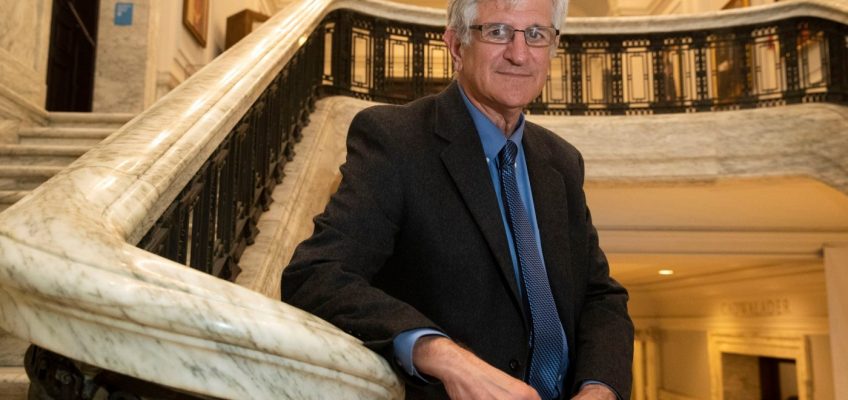PHILADELPHIA — Trust in public health agencies declined during the COVID-19 pandemic, as misinformation about vaccines and the virus proliferated on social media. But did the public health agencies themselves also play a role in the decline of their credibility?
Paul Offit had a front-row seat to federal public health agencies’ pandemic response. A pediatrician and vaccine developer from the Children’s Hospital of Philadelphia, Offit is a member of the FDA’s vaccine advisory committee, which played a critical role in reviewing COVID vaccine research and advising the FDA on vaccine safety.
In his new book, “Tell Me When It’s Over: An Insider’s Guide to Deciphering Covid Myths and Navigating Our Post-Pandemic World,” Offit chronicles the first years of the pandemic, explains the science of COVID, and traces the rise of anti-vaccine movement and misinformation. He also blames those charged with protecting the nation’s health of taking action against evidence — and in doing so undermining public trust.
He says public health agencies made mistakes in key moments, such as when the FDA fast tracked in 2020 the authorization of an antimalaria drug with risk of fatal heart side effects that didn’t work against COVID. At the time, President Donald Trump called the medication a “game changer” and promoted it as a COVID treatment. The FDA revoked the authorization a few months later.
“People lost faith in the FDA,” Offit said. “People saw that you could twist the FDA’s arm.”
The Inquirer spoke to Offit about his new book, and what steps public health agencies can take to reclaim the public’s trust.
Best of times, worst of times
The pandemic saw significant scientific advancement. Scientists were able to produce a safe and effective vaccine to protect against a new virus within a year — a feat that can take more than 10 years. Offit called the vaccine “the greatest” medical achievement in his lifetime.
At the same time, more people grew suspicious of vaccines, and their mistrust continued to grow through last fall, according to surveys by the Annenberg Public Policy Center at the University of Pennsylvania. In the center’s most recent survey, 71% agreed that vaccines approved in the U.S. are safe, down from 77% in April 2021.
The way public health agencies and elected officials communicated also contributed to the public’s loss of faith, Offit said.
He criticized the response to a July 4, 2021, celebration in Provincetown, Mass. After thousands of people attended the event, nearly 350 fully vaccinated men were among those who developed COVID. Only four of those vaccinated were hospitalized, and the rest developed mild or no symptoms.
Offit saw a success: the vaccines were working.
But the Centers for Disease Control and Prevention used the term “breakthrough infection” to describe the incident, a phrasing choice that Offit said implied failure to offer protection.
Another mixed message came in August 2021: President Joe Biden promoted booster shots for American adults even though boosters had not been approved by the FDA yet.
A month later, the FDA advisory committee overwhelmingly voted against the recommendation to offer boosters to people under age 65, because there wasn’t enough evidence at the time that an extra dose would improve protection to people of all ages.
The conflicting messages added to public distrust, Offit said.
The FDA began expanding the eligibility for boosters in Nov. 2021, and currently recommends that everyone over a ge 6 months receive an extra shoot.
Neither the FDA nor the CDC responded to request for comment about Offit’s criticism. A spokesperson for the FDA shared a statement saying the agency stands by the safety and effectiveness of the COVID vaccines.
Admitting mistakes and going on offense
Rebuilding trust in public health agencies won’t be easy, Offit said. But he has some ideas for how to move forward.
Science and knowledge are always evolving, which means the best advice experts can offer may change. Public health agencies shouldn’t shy away from that fact and should do more to explain the scientific process, Offit said.
“You have to trust the American public to at least tell them the truth,” he said. “It’s OK to make your best guess and get it wrong, but say that.”
Offit also wants to see public health agencies more aggressively responding to anti-vaccination claims and other misinformation. When misinformation is spread, public health agencies should spend resources on campaigns disputing the claims with science.
People who advocate against vaccines “harm children,” he said, pointing to the recent measles outbreaks in the U.S, and he wants public health agencies to portray them as such.
“Hammer back,” Offit said.
©2024 The Philadelphia Inquirer, LLC. Visit at inquirer.com. Distributed by Tribune Content Agency, LLC.


Leave a Reply